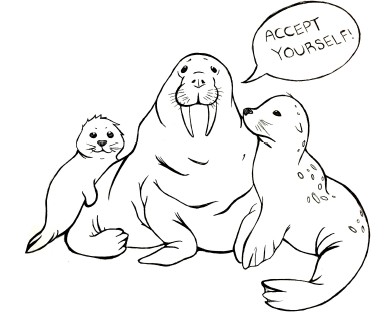Why body-shaming in the form of good intentions does more harm than good
 By: BRITTNEY FARROW
By: BRITTNEY FARROW
Opinions Editor
For those who do not use social media, or for those who simply have not seen the video, the best way to sum up self-titled Youtube “comedian” Nicole Arbour’s “Dear Fat People” video would be to say the following: crass, mean-spirited adult wearing hair chalk takes inspiration from the comedic efforts of middle school boys to shame fat people for their weight under the guise of being “concerned for their health”.
In said video thin, conventionally attractive Arbour recalls the “horror” of being forced to sit next to an overweight person on a plane; the atrocity of being cut in line by a heavy family at the airport. She states that overweight people have an aroma of sausages, and that they ooze Crisco from their pores like Play-Doh.
Arbor also says that when fat people complain about discrimination, they are essentially playing a race card. “Fat shaming is not a thing,” Arbor says confidently, “Fat people made that up.”
I normally use my space in this newspaper to address important topics circulating through mainstream news. With that being said, I firmly believe that the ignorance of one person on the internet can be just as important to discuss, because at the heart of videos like “Dear Fat People” lies a much deeper problem, and that problem is universal. It’s called body-shaming, and it sparks a nasty side effect called self-hatred.
For whatever reason, there seems to be a widespread belief that any hurtful insult or comment thrown at overweight people can be justified by claiming a concern for their health.
While there is no scientific equation for the amount of weight a person has to gain or carry to start hearing these mock-up anxieties, it can be incredibly dehumanizing for people to receive these comments from so many people – especially so frequently from people they barely know on such a regular basis. In fact, it can completely decimate one’s self-esteem before they have even been given the chance to let their self-confidence grow. Of that, I am 100 percent certain. How would I know? Simple – because it happened to me.
The problem with people judging a person’s health by their outward appearance is that it is impossible to determine what kind of illnesses they have (if any) by just looking at them.
Because of that simple fact, saying awful things to someone for the sake of wanting to express concern for them and their health (which is, quite honestly, none of their business anyway) is actually disgusting and infuriating. A person’s jean size does not reveal how well they take care of themselves.
Furthermore, it does not make any indications about what kind of medical issues they struggle with; it does not tell someone else if they have thyroid disease, heart problems, diabetes or a slew of other symptoms which could cause them to hold on to weight. It says literally nothing in terms of health. The only thing a person’s body size tells us is that they are existing in that form.
If people really were concerned with the health of others – even the health of complete strangers – they would consider mental health, and the damage that being insensitive and spiteful can do to a person’s brain.
According to the Walden Center for education and research, 91 percent of female college students have used dieting in an attempt to control their weight and 40 percent of female college students suffer from an eating disorder.
Contrary to some of the things we have heard, eating disorders are very much a mental illness, and the toll they take on a person’s life can be devastating.
Not only can eating disorders cause medical issues like intestinal failure, but they can even lead to infertility and death. Who cares about that though, right? So long as their body is tight and they do not have to shop in the plus size department.
I have never suffered from an eating disorder, but I personally have let my poor body image control my life. Even before puberty, I was never as thin as my friends. My body type is borderline; some people would consider me to be standard and “normal”, while others might say that I am overweight.
At the young age of 11, I started to realize that some people treated me differently because of that. Before I had even stopped playing with Barbies I was putting myself on a diet, and while I no longer view myself as harshly as I did then, the issues that came from being subjected to a childhood of weight pressures have never left me.
I have had a lot of diseases and I suffer from a lot of conditions, but none of them have been so hard to treat as my own personal vendetta against my body.
What people like Arbour and those who agree with her views do not realize is that overweight people do not need to be told they might be hurting themselves because they carry hurt with them every day.
The consequences of low self-esteem induced by body-shaming might as well be open wounds. It is the pain I feel every time my mother calls another girl beautiful, knowing that I can count the amount of times she has said that about me on one hand; it is the guilt I feel toward my romantic partners for not looking like the girls in magazines or on television; it is the voice in the back of my head telling me that I, being newly-single, will never find love again because my aesthetic appeal is up for debate.
Since the beginning of my college career, I have learned so much about how to love myself and I have made great strides. With that being said, it is a constant, unrelenting uphill battle. In her video, Arbour likely was not talking about me.
I do not fit into the mold of the type of fat person that so many people seem to feel just in criticizing; however, I have not been spared the shame of looking at my body like it is flawed and undesirable.
I do not take pictures of myself because I hate the way my fleshy cheeks look in photographs; I haven’t bought a pair of denim jeans in a year because I know I have put on some weight, and I do not want to be labelled as a girl who has to wear double-digit pant sizes. I have been subjected to my friends finding me annoying for not wanting to be tagged in our group photos, and having to listen to them tell me my harshest critic is myself – as if I did not know that. As if I did not wish I could look at myself from a different perspective.
It is standing there completely helpless while men around me decide if my hips and bust make up for the few pounds extra I carry in my midsection.
As much hurt as I have suffered from body-shaming and as personally as it has affected me, it is not a personal issue. From the beginning of my adolescence until this current date, I have seen people tear themselves down because of comments made by people like Arbour more times than I could possibly hope to count. It is something I see all the time.
It is my best friend from college dealing with the aftermath of her eating disorder; it is a girl I worked with at a summer camp refusing to go back to the cafeteria for seconds even though she was starving. It is a little boy at the pool sitting at the edge of the water in a tee shirt, refusing to dive in.
Our bodies do not define us. They are not indicators of our intelligence, our beauty or our potential. They are merely the vehicles we use to carry on with our lives. Whether we have size two petite frames or hearty stomach rolls, we should never feel ashamed of the skin we live in. Furthermore, we should never let our perception of other people’s outward appearances affect the way they view themselves. Why people cannot understand that concept is a mystery to me.
In writing this piece, I recalled the obstacles I have suffered through due to being made to feel inadequate and I cannot understand why anyone would wish those kinds of feelings on another person. It just does not make sense to me. It is a sick and twisted punishment for not looking the way society says I need to.
So I will conclude by asking that we all take a step back from the things we say and recognize the grotesque nature of body-shaming. That we will stop finding amusement in taking photos of heavy people out in public, and laughing at them despite the discomfort they might be feeling. That we will remind our friends and family members that their body is their own, and they should love it in any shape. That making Youtube videos comparing fat people to Frankenstein when they walk is vile and cowardly. Lastly, that supporting the career of someone with cruel intentions is shameful and disappointing, and that it should not be condoned.
Dear fat people:
You are worthy. You are brilliant and deserving. You are capable of more love than what you have been given.











